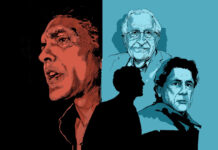Disclaimer: The Eqbal Ahmad Centre for Public Education (EACPE) encourages critical and independent thinking and believes in a free expression of one’s opinion. However, the views expressed in contributed articles are solely those of their respective authors and do not necessarily reflect the position or policy of the EACPE.
Our government of late has indulged in a concerted drive to enforce intellectual conformity on its citizens, despite their varied sense of history and belief systems. At times, the impositions have used sophisticated means, such as a slick use of propaganda to relay a curated narrative. At other occasions, the approach has been coercive, such as censorships or outright pressure to influence those that deviate from the official account. Although following a rigid ideology might be considered a useful trait for some professions, its application across the entire population is neither feasible nor desirable. In fact, multiplicity of opinion is inborn for people and its suppression is simply not sustainable. Hence, in the long run, irrespective of what mechanisms are used for mind control, these efforts will end up being exercises in futility.
The presence of conflicting opinions within a population has historically been encouraged by many early civilisations. For example, within the ancient Greek philosophy, the term dialectical process refers to a system of seeking the truth through a logical debate between divergent viewpoints. In that way, dialectics is even thought to have provided the very foundation for an independent judicial system. Its impartiality is safeguarded by having the prosecution and defence argue their respective versions to support the jury in determining a fair outcome. Hence, in many ways, this exemplifies how the state could aptly channelise dialectical thinking to achieve broader societal objectives.
Hegel (1770-1831), a renowned German philosopher, presented a modified version of dialectics that explains the evolutionary growth of civilisations. The Hegelian dialectical process, which was introduced a couple of centuries ago, consists of three main stages. Firstly, the presence of differing societal beliefs that are referred as thesis and their respective antithesis. Secondly, the conflict resolution process that results in the synthesis of dissimilar viewpoints. And finally, the emergence of a fresh antithesis to counter the new synthesis, which takes us back to the first stage and then the nonstop recurrence. In a general sense, the dialectical system describes the journey of a civilisation that continuously changes through the repetitive interplay of divergent set of ideas. During this voyage, every iterative cycle is a progression to a higher form of maturity when compared to its previous level. Therefore, the word ‘zeitgeist’ is often linked with the dialectical process since it encapsulates the ever-changing nature of societal morals and defines it strictly in association with a specific time period.
Any state that wishes to curb the dialectical process by pushing a specific doctrine is bound to fail since diversity of opinions is innate for humans. In the field of psychology, the phenomenon of cognitive bias highlights that people arrive at differing conclusions even when they are exposed to the same content. This surprising outcome occurs because an individual often draws conflicting inferences from an experience, and cognitive bias helps with its resolution. It does that by constructing a digestible summary that is influenced by that person’s unique circumstances. Therefore, an identical narrative often evokes opposing sentiments within different individuals reflecting their specific traits. There are many examples of cognitive biases, although a popular one is called confirmation bias, which refers to our tendency to favour deductions that validate our existing beliefs. Hence, even if a dogmatic script is forced down our throats, the mere presence of variety in our background ensures that our learnings stay distinct.
Dissent cannot be eradicated even with relentless use of propaganda.
A simple but somewhat theoretical example will further elaborate the concept of cognitive bias. Imagine an instructor displaying a photograph of a red flower against a blue backdrop to infants that may never have seen similar images. The teacher could then, without making any gestures, make an announcement that the picture is that of a flower. Now, a few students might reasonably conclude that the flower is being referred to the red colour, whereas, some others could associate flower with its shape. Additionally, a few more learners may relate flower to the blue colour in the background. The key insight here is that there are several valid hypotheses, and it is completely logical for children to settle on any one of them. So, what makes a pupil choose one inference over the others despite all of them being consistent? That is where cognitive bias plays its role and based on an infant’s past exposure, their mind converges to any of the viable alternatives. Therefore, the net result will be a classroom full of students that have different interpretations of what it means to be a flower. Hence, this example highlights that even though the children went through an identical situation, they naturally ended up forming multiple clusters of varying opinions.
In the above example, the divergent inferences drawn from the picture do not always stay the same. In fact, as more images are presented, the children are likely to modify their interpretations. For instance, let us suppose that the instructor now presents the same picture of the flower, but now in yellow colour and with the same blue background. In this case, those students that had linked the definition of a flower to the red colour are likely to modify their beliefs. In simple situations as above, the conclusions will converge to the correct definition, such as that of a flower. However, in real life situations, due its vastness and sheer complexity, the opinions will continually evolve independently but without ever achieving total unanimity.
In summary though, the presence of dissent in an environment is both dependent on the type of information we consume, as well as the variety that exists in our personalities. When a state puts limitation on the dissemination of free speech, it is at best controlling only one out of the two main factors. Hence, even in such draconian environments, dissent will eventually flourish so long as there is diversity in the characteristics of the population. Therefore, it is not surprising to find authoritarian regimes failing to eliminate their opposition, even with relentless relaying of one-sided broadcasts to its citizens.
Recently, the US federal government has announced a grant to support the development of what it calls a ‘patriotic’ curriculum to teach nationwide in schools. Although the government can control the version of history promoted within its population, it cannot regulate how it will be received, interpreted, and what is learnt from it. This is simply because the state can never eliminate the varied upbringing, beliefs, gender, and language of its population. Hence, the so-called patriotic curriculum will induce different opinions when examined by various communities, such as the African Americans, or by specific population segments such as women. In the long run, irrespective of how it is tailored, any dogmatic curriculum will ultimately fail in its objective of achieving indoctrination. Therefore, instead of enforcing a tailored narrative, the states are better off in embracing cognitive diversity and facilitating the dialectics to work its magic. By following this strategy, a society will grow intellectually by progressively improving its understanding of the world and its history.
 Vaqar Khamisani is based in London and works as a Global Director of Insights for a leading information-based analytics company.
Vaqar Khamisani is based in London and works as a Global Director of Insights for a leading information-based analytics company.



 Vaqar Khamisani is based in London and works as a Global Director of Insights for a leading information-based analytics company.
Vaqar Khamisani is based in London and works as a Global Director of Insights for a leading information-based analytics company. 



